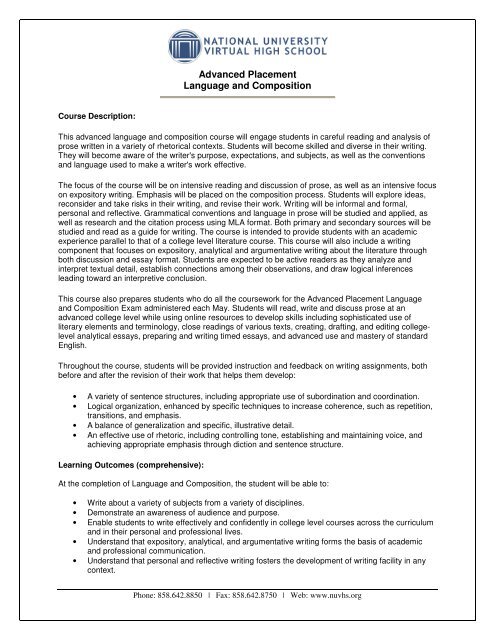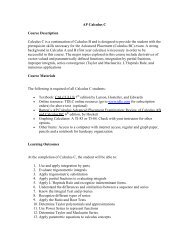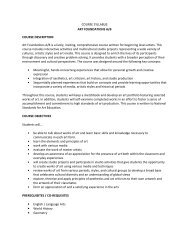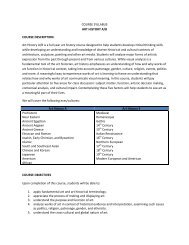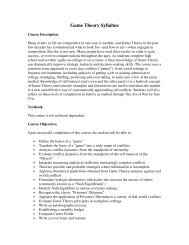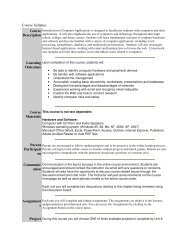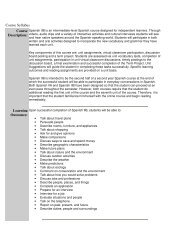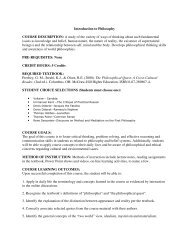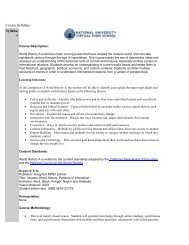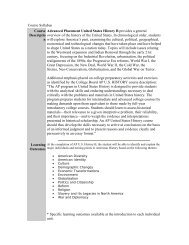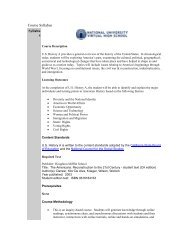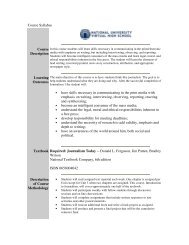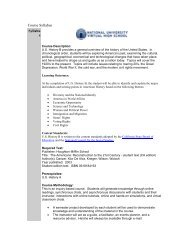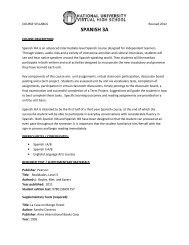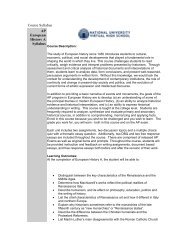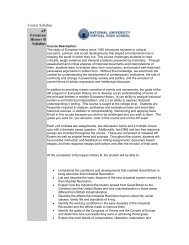AP Language and Composition
AP Language and Composition
AP Language and Composition
Create successful ePaper yourself
Turn your PDF publications into a flip-book with our unique Google optimized e-Paper software.
Advanced Placement<br />
<strong>Language</strong> <strong>and</strong> <strong>Composition</strong><br />
Course Description:<br />
This advanced language <strong>and</strong> composition course will engage students in careful reading <strong>and</strong> analysis of<br />
prose written in a variety of rhetorical contexts. Students will become skilled <strong>and</strong> diverse in their writing.<br />
They will become aware of the writer's purpose, expectations, <strong>and</strong> subjects, as well as the conventions<br />
<strong>and</strong> language used to make a writer's work effective.<br />
The focus of the course will be on intensive reading <strong>and</strong> discussion of prose, as well as an intensive focus<br />
on expository writing. Emphasis will be placed on the composition process. Students will explore ideas,<br />
reconsider <strong>and</strong> take risks in their writing, <strong>and</strong> revise their work. Writing will be informal <strong>and</strong> formal,<br />
personal <strong>and</strong> reflective. Grammatical conventions <strong>and</strong> language in prose will be studied <strong>and</strong> applied, as<br />
well as research <strong>and</strong> the citation process using MLA format. Both primary <strong>and</strong> secondary sources will be<br />
studied <strong>and</strong> read as a guide for writing. The course is intended to provide students with an academic<br />
experience parallel to that of a college level literature course. This course will also include a writing<br />
component that focuses on expository, analytical <strong>and</strong> argumentative writing about the literature through<br />
both discussion <strong>and</strong> essay format. Students are expected to be active readers as they analyze <strong>and</strong><br />
interpret textual detail, establish connections among their observations, <strong>and</strong> draw logical inferences<br />
leading toward an interpretive conclusion.<br />
This course also prepares students who do all the coursework for the Advanced Placement <strong>Language</strong><br />
<strong>and</strong> <strong>Composition</strong> Exam administered each May. Students will read, write <strong>and</strong> discuss prose at an<br />
advanced college level while using online resources to develop skills including sophisticated use of<br />
literary elements <strong>and</strong> terminology, close readings of various texts, creating, drafting, <strong>and</strong> editing collegelevel<br />
analytical essays, preparing <strong>and</strong> writing timed essays, <strong>and</strong> advanced use <strong>and</strong> mastery of st<strong>and</strong>ard<br />
English.<br />
Throughout the course, students will be provided instruction <strong>and</strong> feedback on writing assignments, both<br />
before <strong>and</strong> after the revision of their work that helps them develop:<br />
• A variety of sentence structures, including appropriate use of subordination <strong>and</strong> coordination.<br />
• Logical organization, enhanced by specific techniques to increase coherence, such as repetition,<br />
transitions, <strong>and</strong> emphasis.<br />
• A balance of generalization <strong>and</strong> specific, illustrative detail.<br />
• An effective use of rhetoric, including controlling tone, establishing <strong>and</strong> maintaining voice, <strong>and</strong><br />
achieving appropriate emphasis through diction <strong>and</strong> sentence structure.<br />
Learning Outcomes (comprehensive):<br />
At the completion of <strong>Language</strong> <strong>and</strong> <strong>Composition</strong>, the student will be able to:<br />
• Write about a variety of subjects from a variety of disciplines.<br />
• Demonstrate an awareness of audience <strong>and</strong> purpose.<br />
• Enable students to write effectively <strong>and</strong> confidently in college level courses across the curriculum<br />
<strong>and</strong> in their personal <strong>and</strong> professional lives.<br />
• Underst<strong>and</strong> that expository, analytical, <strong>and</strong> argumentative writing forms the basis of academic<br />
<strong>and</strong> professional communication.<br />
• Underst<strong>and</strong> that personal <strong>and</strong> reflective writing fosters the development of writing facility in any<br />
context.<br />
Phone: 858.642.8850 | Fax: 858.642.8750 | Web: www.nuvhs.org
Advanced Placement<br />
<strong>Language</strong> <strong>and</strong> <strong>Composition</strong><br />
• Underst<strong>and</strong> that the expository, analytical, <strong>and</strong> argumentative writing done in college is based on<br />
reading as well as personal experience <strong>and</strong> observation.<br />
• Read primary <strong>and</strong> secondary sources carefully to synthesize material from those texts in student<br />
compositions.<br />
• Cite sources using conventions recommended by professional organizations.<br />
• Enable students to read complex texts with underst<strong>and</strong>ing.<br />
• Write prose of sufficient richness <strong>and</strong> complexity to communicate effectively with mature readers.<br />
• Place emphasis on content, purpose <strong>and</strong> audience <strong>and</strong> to follow this focus to guide the<br />
organization of student writing.<br />
• Be aware of his/her own composing process.<br />
• Underst<strong>and</strong> how they explore ideas, reconsider strategies <strong>and</strong> revise work.<br />
• Write essays that proceed through several stages or drafts, with revision aided by teacher <strong>and</strong><br />
peers.<br />
• Become more self-aware <strong>and</strong> flexible writers.<br />
• Identify writer’s strategies <strong>and</strong> practice them themselves.<br />
• Study language itself.<br />
• Underst<strong>and</strong> the difference between oral <strong>and</strong> written discourse, formal <strong>and</strong> informal language,<br />
historical changes in speech <strong>and</strong> writing.<br />
• Participate in imitation exercises, journal keeping, collaborative writing <strong>and</strong> in-class responses.<br />
• Use research materials <strong>and</strong> synthesize varied sources—evaluate, use, <strong>and</strong> cite.<br />
• Take up projects that call on students to synthesize <strong>and</strong> evaluate sources.<br />
• Write a researched argument paper.<br />
• Be able to form a varied <strong>and</strong> informed argument.<br />
• Consider texts as a source written for particular audience <strong>and</strong> purpose.<br />
• Sort through disparate interpretations to analyze, reflect upon, <strong>and</strong> write about a topic.<br />
• Practice reinforcing writing conventions<br />
• Sharpen grammar <strong>and</strong> style.<br />
• Use grammatical conventions appropriately <strong>and</strong> to develop stylistic maturity in prose.<br />
• Develop a wide range of vocabulary <strong>and</strong> use it appropriately <strong>and</strong> effectively.<br />
• Use a variety of sentence structures, including appropriate use of subordination <strong>and</strong> coordination.<br />
• Formulate logical organization, enhanced by specific techniques to increase coherence, such as<br />
repetition, transitions, <strong>and</strong> emphasis.<br />
• Balance generalized <strong>and</strong> specialized illustrative detail.<br />
• Use rhetoric effectively by controlling tone, establishing <strong>and</strong> maintaining voice, <strong>and</strong> achieving<br />
appropriate emphasis through diction <strong>and</strong> sentence structure.<br />
• Be aware of how stylistic effects are achieved by writer’s linguistic choices.<br />
• Analyze <strong>and</strong> interpret samples of good writing.<br />
• Identify <strong>and</strong> explain an author’s use of rhetorical strategies <strong>and</strong> techniques.<br />
• Apply effective strategies <strong>and</strong> techniques in their own writing.<br />
• Create <strong>and</strong> sustain arguments based on readings, research, <strong>and</strong> / or personal experience.<br />
• Write for a variety of purposes.<br />
• Produce expository, analytical, <strong>and</strong> argumentative compositions that introduce a complex central<br />
idea <strong>and</strong> develop it with appropriate evidence drawn from primary <strong>and</strong> / or secondary sources,<br />
cogent explanations, <strong>and</strong> clear transitions.<br />
• Demonstrate underst<strong>and</strong>ing <strong>and</strong> mastery of st<strong>and</strong>ard written English as well as stylistic maturity<br />
in their own writings.<br />
• Demonstrate underst<strong>and</strong>ing of the conventions of citing primary <strong>and</strong> secondary sources.<br />
Phone: 858.642.8850 | Fax: 858.642.8750 | Web: www.nuvhs.org
Advanced Placement<br />
<strong>Language</strong> <strong>and</strong> <strong>Composition</strong><br />
• Move effectively through the stages of the writing process, with careful attention to inquiry <strong>and</strong><br />
research, drafting, revising, editing, <strong>and</strong> review.<br />
• Write thoughtfully about their own process of composition.<br />
• Revise a work to make it suitable for a different audience.<br />
• Analyze image as text.<br />
• Evaluate <strong>and</strong> incorporate reference documents into research papers.<br />
• Answer multiple-choice questions similar to those on the <strong>Language</strong> <strong>and</strong> <strong>Composition</strong> exam, <strong>and</strong><br />
use computer technology <strong>and</strong> the Internet to complement an underst<strong>and</strong>ing of literature.<br />
Throughout the course, students will be provided instruction <strong>and</strong> feedback on writing assignments,<br />
document based essays, <strong>and</strong> free response essays both before <strong>and</strong> after the revision of their work.<br />
Content St<strong>and</strong>ards:<br />
This Advanced Placement <strong>Language</strong> <strong>and</strong> <strong>Composition</strong> course is written to the content st<strong>and</strong>ards outlined<br />
by the College Board’s <strong>AP</strong> <strong>Language</strong> <strong>and</strong> <strong>Composition</strong> Guidelines.<br />
Prerequisites:<br />
At least a B in most recent English courses <strong>and</strong> appropriate writing skills.<br />
Required Texts:<br />
Primary Text:<br />
Title: Literature for <strong>Composition</strong><br />
Author(s): Barnet, Burto, Cain<br />
Publisher: Pearson Longman<br />
Year published: 2005<br />
ISBN 0-321-28034-2<br />
Title: Rhetorical Grammar<br />
Author(s): Kolln, Martha<br />
Publisher: Allyn <strong>and</strong> Bacon<br />
Year published: 1999<br />
ISBN 0-205-28305-5<br />
Student Supplements:<br />
Title: Narrative of the Life of Frederick Douglass, an American Slave<br />
Author(s): Douglass, Frederick<br />
Publisher: Barnes & Noble Classics<br />
Year published: Reprint edition 2003<br />
ISBN 978-1-59308-041-9<br />
Title: Incidents in the Life of a Slave Girl<br />
Author(s): Jacobs, Harriet<br />
Publisher: Townsend Press<br />
Year published: 2004<br />
ISBN 978-1-59194-026-5<br />
Phone: 858.642.8850 | Fax: 858.642.8750 | Web: www.nuvhs.org
Advanced Placement<br />
<strong>Language</strong> <strong>and</strong> <strong>Composition</strong><br />
Title: Angela’s Ashes<br />
Author (s): McCourt, Frank<br />
Publisher: Simon <strong>and</strong> Schuster Adult Publishing Group<br />
Year Published: May 1999<br />
ISBN-13: 9780684842677<br />
Title: Naked<br />
Author (s): David Sedaris<br />
Publisher: Back Bay Books<br />
Year Published: 1998<br />
ISBN-13: 978-0316777735<br />
Course Methodology:<br />
This is an inquiry-based course where you will discover <strong>and</strong> utilize knowledge of English language <strong>and</strong><br />
composition via the textbook, videos, <strong>and</strong> other readings, along with websites, <strong>and</strong> synchronous <strong>and</strong><br />
asynchronous discussions with other students <strong>and</strong> the instructor.<br />
Acting as a facilitator, your instructor will guide you through the process; however, as the learner, you are<br />
responsible for actively acquiring <strong>and</strong> constructing knowledge by completing all assigned readings <strong>and</strong><br />
activities.<br />
Both formal <strong>and</strong> informal assessment will be used in evaluating your performance throughout the course.<br />
Informal assessment will include an evaluation of the quality <strong>and</strong> timeliness of your participation in class<br />
activities. Formal assessment will involve multiple-choice quizzes, written essays, timed writings, <strong>and</strong> a<br />
final exam.<br />
Phone: 858.642.8850 | Fax: 858.642.8750 | Web: www.nuvhs.org
Advanced Placement<br />
<strong>Language</strong> <strong>and</strong> <strong>Composition</strong><br />
Semester One<br />
Unit Topic Activities<br />
1 The Reader as<br />
a Writer<br />
Unit Goals:<br />
• Read critically <strong>and</strong> discussed several short stories.<br />
• Learned components for the <strong>AP</strong> exam.<br />
• Written several dialectical journal entries.<br />
• Successfully completed an author <strong>and</strong> theme study.<br />
• Prepared for a unit quiz.<br />
• Responded to readings aurally <strong>and</strong> visually.<br />
• Studied <strong>and</strong> completed a full essay assignment covering argument <strong>and</strong><br />
theme.<br />
• Explored the online lab <strong>and</strong> Internet resources.<br />
Lectures:<br />
• Reading <strong>and</strong> Responding to Literature<br />
• How to Read Literature: Dramatic Literature, Epic, Poetry, Prose<br />
• Study of works by Kate Chopin<br />
• A Story of an Hour by Chopin<br />
Study Guide:<br />
• Self-assessment questions<br />
• Glossary of terms/individuals/events<br />
• Additional terms/individuals/events<br />
• Resources (chapter outlines, flash cards, interactive maps, Web links<br />
<strong>and</strong> interactive crossword puzzles)<br />
Required Reading:<br />
• Ripe Figs<br />
• The Reader as Writer<br />
• Desiree's Baby by Kate Chopin<br />
• The Storm by Kate Chopin<br />
• The Story of an Hour by Kate Chopin<br />
Required Viewing:<br />
• Elements of Setting<br />
• Values <strong>and</strong> Story of an Hour<br />
Online Supplements:<br />
My Literature Lab I <strong>and</strong> II<br />
Phone: 858.642.8850 | Fax: 858.642.8750 | Web: www.nuvhs.org
Advanced Placement<br />
<strong>Language</strong> <strong>and</strong> <strong>Composition</strong><br />
Semester One<br />
Unit Topic Activities<br />
Recommended Reading:<br />
• MLA Formatting <strong>and</strong> Style Guide<br />
• Writing About Literature<br />
Assignments:<br />
• Writing response to Ripe Figs by Chopin<br />
• Literature Lab I- Chopin<br />
• Theme topics on works by Chopin<br />
• Point of View chart<br />
• Essay response to Desiree's Baby or The Storm by Chopin<br />
• Literature Lab II- Diagnostic Exam on literary elements<br />
• Dialectical Journal<br />
• SO<strong>AP</strong>ST one responses to Desiree’s Baby <strong>and</strong> The Storm by Kate<br />
Chopin<br />
• Developing a thesis: Draft <strong>and</strong> write <strong>and</strong> argument<br />
Threaded Discussion Forum Topics:<br />
• Values <strong>and</strong> the Story of an Hour<br />
• Learning Styles Assessment<br />
Assessment:<br />
2 Rhetoric Unit Goals:<br />
• Quiz (20 multiple choice items <strong>and</strong> one essay question)<br />
• Timed Writing – Free Response Essay 1: The Storm by Chopin<br />
• Objective Test: Problematic characters in The Storm<br />
• Diagnostic Exam of Literary <strong>and</strong> Critical Terms<br />
• Familiarized themselves with learn, <strong>and</strong> discussed basic rhetorical<br />
terms <strong>and</strong> grammar.<br />
• Written several dialectic journal entries.<br />
• Read <strong>and</strong> applied the Art of Rhetoric in literature, composition,<br />
advertising, <strong>and</strong> communication.<br />
• Explored the online resources of the class.<br />
• Reinforced their knowledge of terms through a quiz.<br />
• Response to readings aurally <strong>and</strong> visually.<br />
• Prepared for a timed essay/assessment.<br />
Phone: 858.642.8850 | Fax: 858.642.8750 | Web: www.nuvhs.org
Advanced Placement<br />
<strong>Language</strong> <strong>and</strong> <strong>Composition</strong><br />
Semester One<br />
Unit Topic Activities<br />
Lectures:<br />
• Preface <strong>and</strong> Introduction to Rhetorical Grammar<br />
• The Structure of Sentences<br />
• Sentence Rhythm<br />
• Rhetorical Triangle<br />
• Rhetoric of Advertising<br />
Study Guide:<br />
• Self-assessment questions<br />
• Glossary of terms/individuals/events<br />
• Additional terms/individuals/events<br />
• Resources (chapter outlines, flash cards, interactive maps, Web links<br />
<strong>and</strong> interactive crossword puzzles)<br />
Required Reading:<br />
Rhetorical Grammar Text:<br />
• Preface- Pages Viii-X<br />
• Introduction-Pages 1-4<br />
• The Structure of Sentences- Pages 5-23<br />
• Sentence Rhythm- Pages 24-39<br />
Required Viewing:<br />
• Rhetorical Practice<br />
• Writing About Literature<br />
Online Supplements:<br />
• Center for Media Literacy<br />
Assignments:<br />
• Journal for rhetorical devices<br />
• Rhetorical Grammar Exercises<br />
• Rhetoric of Advertising- five selections/responses<br />
• Rhetorical Grammar Exercises<br />
• Power, Persuasion, <strong>and</strong> Propag<strong>and</strong>a Project<br />
• Revision of Theme Essay from Unit I<br />
Phone: 858.642.8850 | Fax: 858.642.8750 | Web: www.nuvhs.org
Advanced Placement<br />
<strong>Language</strong> <strong>and</strong> <strong>Composition</strong><br />
Semester One<br />
Unit Topic Activities<br />
Threaded Discussion Forum Topics:<br />
• Identify underlying assumptions in ads, restate the advertisers claim<br />
<strong>and</strong> describe your response.<br />
• Pathos, Logos, Ethos<br />
Assessment:<br />
• Quiz (20 multiple choice items <strong>and</strong> one essay question)<br />
• True/False quiz- rhetorical grammar devices<br />
• Timed Essay- Traditional Definition of Rhetoric<br />
3 Reading<br />
Literature<br />
Closely<br />
Unit Goals:<br />
• Familiarized themselves with <strong>and</strong> demonstrated effective use of<br />
essential critical reading <strong>and</strong> essay evaluation skills<br />
• Demonstrated effective analysis of a variety of textual genres including<br />
expository, literary, poetic <strong>and</strong> essay forms<br />
• Understood <strong>and</strong> utilized the essential elements of effective literary<br />
evaluation <strong>and</strong> analysis in written form<br />
• Effectively synthesized material from a variety of texts into their own<br />
writing<br />
• Completed a variety of textual analysis activities including expository,<br />
reflective <strong>and</strong> critical forms<br />
• Understood <strong>and</strong> demonstrated the differences between explicative <strong>and</strong><br />
analytic writing genres<br />
• Completed timed writings that demonstrate competency in textual<br />
explicative <strong>and</strong> analysis<br />
Lectures:<br />
• Why value literature: Explication <strong>and</strong> Explication de Texte<br />
• Analysis <strong>and</strong> its Forms: Writing an Effective Literary Analysis<br />
Study Guide:<br />
• Self-assessment questions<br />
• Glossary of terms/individuals/events<br />
• Additional terms/individuals/events<br />
• Resources (chapter outlines, flash cards, interactive maps, Web links<br />
<strong>and</strong> interactive crossword puzzles)<br />
Required Reading:<br />
Phone: 858.642.8850 | Fax: 858.642.8750 | Web: www.nuvhs.org
Advanced Placement<br />
<strong>Language</strong> <strong>and</strong> <strong>Composition</strong><br />
Semester One<br />
Unit Topic Activities<br />
• Reading Literature Closely: Explication<br />
• Other Kinds of Writing about Literature<br />
• Rhetorical Grammar: Cohesion<br />
• Judgement of Solomon<br />
• The Parable of the Prodigal Son<br />
• James Thurber: The Secret Life of Walter Mitty<br />
• Aphra Behn: Song: Love Armed<br />
• Edgar Allen Poe: The Cask of the Amontillado<br />
• Guy de Maupassant: The Necklace<br />
• Katherine Anne Porter: The Jilting of Granny Weatherall<br />
• Jose’ Armas: El Tonto del Barrio<br />
• Leslie Marmom Silko: The Man to Send Rain Clouds<br />
• Robert Frost: Come In<br />
• Elizabeth Bishop: Filling Station<br />
• Robert Herrick: To the Virgins, to Make Much of Time<br />
• Lyn Lifshin: My mother <strong>and</strong> the Bed by Lyn Lifshin<br />
• Martin Espada: Bully<br />
Online Supplements:<br />
• Explication de Texte<br />
• MyLiteratureLab<br />
Assignments:<br />
• Topics for Critical Thinking <strong>and</strong> Writing: Sonnet 73<br />
• Topics for Critical Thinking <strong>and</strong> Writing: Spellbound by Emile Bronte<br />
• Explication: The Death of the Ball Turret Gunner<br />
• Analysis: Poem or Short Story<br />
• Dialectical Journal<br />
• MyLiteratureLab responses to literature<br />
Threaded Discussion Forum Topics:<br />
• Differences between Explication <strong>and</strong> Analysis<br />
• Main Points between Writing <strong>and</strong> Effective Comparison<br />
Assessment:<br />
• Quiz (20 multiple choice items <strong>and</strong> one essay question)<br />
• Timed Writing – Freedom: the Necklace <strong>and</strong> El Tonto del Barrio<br />
• Timed Writing- Parallelism <strong>and</strong> Pedagogical Principles<br />
4 Narrative of<br />
the Life of<br />
Unit Goals:<br />
Phone: 858.642.8850 | Fax: 858.642.8750 | Web: www.nuvhs.org
Advanced Placement<br />
<strong>Language</strong> <strong>and</strong> <strong>Composition</strong><br />
Semester One<br />
Unit Topic Activities<br />
Frederick<br />
Douglass an<br />
American<br />
Slave<br />
• Examined <strong>and</strong> identified rhetorical strategies utilized in writing focusing<br />
on specific topical themes<br />
• Identified <strong>and</strong> understood effective stylistic writing choices <strong>and</strong> how they<br />
influence effective writing strategies to engage readers<br />
• Completed a variety of writing activities that demonstrate underst<strong>and</strong>ing<br />
of writing strategies <strong>and</strong> styles<br />
• Identified <strong>and</strong> understood historical identifiers in specific written works<br />
<strong>and</strong> the evolution of writing strategies over time<br />
• Read <strong>and</strong> evaluated secondary essays on their critical analysis of<br />
historical texts<br />
• Completed thematic writing activities to demonstrate underst<strong>and</strong>ing of<br />
the rhetorical components of thematic composition<br />
• Analyzed <strong>and</strong> understood the effectiveness of point of view in written<br />
texts<br />
• Conducted revised writing activities <strong>and</strong> provided critical feedback on<br />
other student writing pieces<br />
Lectures:<br />
• (Review) Native American Works, the Colonial Period in New Engl<strong>and</strong><br />
<strong>and</strong> the South, Major Writers <strong>and</strong> works from the Revolutionary Period,<br />
the Romantic Period, Transition between Romanticism/Realism (Civil<br />
War), The Realistic Period<br />
• The Antebellum South<br />
• Analyzing the <strong>Language</strong> of freedom in Frederick Douglass<br />
• Frederick the Protagonist<br />
Study Guide:<br />
• Self-assessment questions<br />
• Glossary of terms/individuals/events<br />
• Additional terms/individuals/events<br />
• Resources (chapter outlines, flash cards, interactive maps, Web links<br />
<strong>and</strong> interactive crossword puzzles)<br />
Required Reading:<br />
• Narrative of the Life of Frederick Douglass an American Slave<br />
Online Supplements:<br />
• Google Books Online: Narrative of the Life of Frederick Douglass<br />
• Reading Douglass’s Rhetoric<br />
Assignments:<br />
Phone: 858.642.8850 | Fax: 858.642.8750 | Web: www.nuvhs.org
Advanced Placement<br />
<strong>Language</strong> <strong>and</strong> <strong>Composition</strong><br />
Semester One<br />
Unit Topic Activities<br />
• Journal of Critical Observations from the text (Dialectical Journal)<br />
• Study Guide’s for each chapter<br />
• Critical Analysis: Harriet Beecher Stowe<br />
• Response: Dehumanization as a Theme<br />
• Symbolism Through the Use of Characters<br />
• SO<strong>AP</strong>ST one Questions<br />
• Response to Reading Douglass’s Rhetoric<br />
Threaded Discussion Forum Topics:<br />
• First Person Narrative: Effective?<br />
• The Antebellum South<br />
• Slavery vs. Wage Labor<br />
Assessment:<br />
• Quiz (20 multiple choice items <strong>and</strong> one essay question)<br />
• Timed Essay- Critical Analysis from Douglass Text: Freedom<br />
5 Reading <strong>and</strong><br />
Writing About<br />
Visual Culture:<br />
Your Personal<br />
Voice<br />
Unit Goals:<br />
• Demonstrated underst<strong>and</strong>ing of visual <strong>and</strong> graphical components of<br />
texts <strong>and</strong> interpretive or textual analysis<br />
• Familiarized themselves with the concept of images in a variety of forms<br />
as textual representatives themselves<br />
• Demonstrated appropriate analysis methodologies when evaluating<br />
images as texts<br />
• Understood <strong>and</strong> applied appropriate written interpretive <strong>and</strong> analysis to<br />
a variety of graphics <strong>and</strong> images<br />
• Understood <strong>and</strong> applied key rhetorical differences <strong>and</strong> similarities in<br />
analyzing texts <strong>and</strong> images<br />
• Developed appropriate underst<strong>and</strong>ing of the narrative components of<br />
images as texts<br />
• Completed writing activities that explicate, interpret <strong>and</strong> analyze images<br />
as texts<br />
• Completed assessments including timed writing to demonstrate ability<br />
to incorporate these methodologies in their own written compositions<br />
• Revised written assignments based on critical feedback by peers<br />
Lectures:<br />
• The <strong>Language</strong> of Pictures: Critically Reading Images<br />
• Analyzing Photography: Techniques for Critique of Photos<br />
Study Guide:<br />
• Self-assessment questions<br />
• Glossary of terms/individuals/events<br />
Phone: 858.642.8850 | Fax: 858.642.8750 | Web: www.nuvhs.org
Advanced Placement<br />
<strong>Language</strong> <strong>and</strong> <strong>Composition</strong><br />
Semester One<br />
Unit Topic Activities<br />
• Additional terms/individuals/events<br />
• Resources (chapter outlines, flash cards, interactive maps, Web links<br />
<strong>and</strong> interactive crossword puzzles)<br />
Required Reading:<br />
• Reading <strong>and</strong> Writing about Visual Culture<br />
• Rhetorical Grammar: Your Personal Voice<br />
• Navajo Dancers Entertaining a Tourist Train, June 1963: Durango,<br />
Colorado<br />
• Migrant Mother, Nipomo, California, 1936<br />
Online Supplements:<br />
• MyLiteratureLab<br />
Assignments:<br />
• Annie Liebowitz Analysis<br />
• MyLiteratureLab responses to literature<br />
• The Qualities of Good Photograph—Illustrations<br />
• Dialectical Journal<br />
• Short Story<br />
Threaded Discussion Forum Topics:<br />
• Reading Images<br />
• Analyzing Photography vs. Analyzing Literature<br />
Assessment:<br />
• Quiz (20 multiple choice items <strong>and</strong> one essay question)<br />
• Timed Writing – Photo Analysis<br />
• Timed Writing—Personal Voice in Analysis<br />
6 Incidents in the<br />
Life of a Slave<br />
Girl written by<br />
Herself<br />
Unit Goals:<br />
• Familiarized <strong>and</strong> understood connection between stylistic effects in<br />
writing are influenced by authors’ linguistic <strong>and</strong> rhetorical choices<br />
• Understood <strong>and</strong> applied rhetorical components of compare contrast<br />
strategy to conduct critical <strong>and</strong> evaluative analysis of different texts<br />
within a specific genre or theme<br />
• Complete writing assignments <strong>and</strong> analysis activities to demonstrate<br />
ability to identify differences between texts <strong>and</strong> explain how rhetorical<br />
elements effect tone, meaning, <strong>and</strong> thematic explication<br />
Phone: 858.642.8850 | Fax: 858.642.8750 | Web: www.nuvhs.org
Advanced Placement<br />
<strong>Language</strong> <strong>and</strong> <strong>Composition</strong><br />
Semester One<br />
Unit Topic Activities<br />
• Completed timed essays, writing revisions, <strong>and</strong> unit exam to<br />
demonstrate underst<strong>and</strong>ing of subtle rhetorical differences in similar<br />
texts<br />
• Composed analytical writing that compares/contrasts multiple texts<br />
focused on a specific theme or experience<br />
• Conducted effective revision strategies on their own writing piece to<br />
demonstrate underst<strong>and</strong>ing of how rhetorical changes effect meaning<br />
• Completed quiz to reinforce knowledge <strong>and</strong> learning outcomes<br />
• Utilized a variety of secondary sources including digital forms to further<br />
strengthen underst<strong>and</strong>ing<br />
Lectures:<br />
• Character Development in Incidents<br />
• Freedom Through Personal Sacrifice<br />
Online Supplements:<br />
• Google Books Online: Incidents in the Life of a Slave Girl Written by<br />
Herself, by Harriet Jacobs<br />
• Site Index, Images, Timeline 1808-1897 (Chronicle of Historical Events<br />
during Jacob’s Life)<br />
Study Guide:<br />
• Self-assessment questions<br />
• Glossary of terms/individuals/events<br />
• Additional terms/individuals/events<br />
• Resources (chapter outlines, flash cards, interactive maps, Web links<br />
<strong>and</strong> interactive crossword puzzles)<br />
Required Reading:<br />
• Incidents in the Life of a Slave Girl written by herself by Harriet Jacobs<br />
Assignments:<br />
• Compare/Contrast: Analysis of Jacob’s text <strong>and</strong> Douglass text<br />
• Revision: Compare/Contrast Analysis<br />
• Study Guide’s for each chapter<br />
• Journal of Critical Observations from the text (Dialectical Journal)<br />
• SO<strong>AP</strong>ST one Questions<br />
• Critical Analysis: Argument on one of the major themes: The Corrupting<br />
Power of Slavery, Domesticity as Paradise or Prison, The Psychological<br />
Abuses of Slavery<br />
Phone: 858.642.8850 | Fax: 858.642.8750 | Web: www.nuvhs.org
Advanced Placement<br />
<strong>Language</strong> <strong>and</strong> <strong>Composition</strong><br />
Semester One<br />
Unit Topic Activities<br />
Threaded Discussion Forum Topics:<br />
• Types of Slavery: Jacob’s vs. Douglass<br />
• The Corrupting Power of the Institution of Slavery<br />
Assessment:<br />
• Quiz (20 multiple choice items <strong>and</strong> one essay question)<br />
• Timed Essay- Symbolism Through Jacob’s Characters<br />
7 Critical<br />
Thinking:<br />
Asking<br />
Questions <strong>and</strong><br />
Making<br />
Comparisons,<br />
Reading <strong>and</strong><br />
Writing About<br />
Essays,<br />
Rhetorical<br />
Grammar:<br />
Long <strong>and</strong><br />
Short<br />
Sentences<br />
Unit Goals:<br />
• Familiarized themselves <strong>and</strong> demonstrated effective critical evaluation<br />
techniques on literature<br />
• Demonstrated ability to effectively analyze a variety of textual genres,<br />
specifically poetry, through written responses<br />
• Familiarized themselves with techniques for analyzing <strong>and</strong> evaluating<br />
both primary <strong>and</strong> secondary evidence within written texts<br />
• Understood <strong>and</strong> demonstrated ability to identify <strong>and</strong> incorporate<br />
rhetorical strategies to effect voice <strong>and</strong> tone within their own written<br />
work<br />
• Demonstrated ability to evaluate legitimacy <strong>and</strong> purpose of evidence<br />
<strong>and</strong> sources within writing<br />
• Demonstrated ability to use compare / contrast strategies in evaluating<br />
<strong>and</strong> writing about literary texts<br />
• Complete timed writings <strong>and</strong> quiz to demonstrate underst<strong>and</strong>ing of<br />
effective literary analysis<br />
• Underst<strong>and</strong> key concepts of rhetorical grammar in writing <strong>and</strong> revision<br />
process of their own written works<br />
• Demonstrated underst<strong>and</strong>ing of sentence structure in textual analysis<br />
<strong>and</strong> written strategies<br />
Lectures:<br />
• Critical Thinking: Compare/Contrast, Asking <strong>and</strong> Answering Questions,<br />
Analyzing <strong>and</strong> Evaluating Evidence<br />
• Critical Reading Essays: Persona, Voice, <strong>and</strong> Tone<br />
Online Supplements:<br />
• MyLiteratureLab<br />
Study Guide:<br />
• Self-assessment questions<br />
• Glossary of terms/individuals/events<br />
Phone: 858.642.8850 | Fax: 858.642.8750 | Web: www.nuvhs.org
Advanced Placement<br />
<strong>Language</strong> <strong>and</strong> <strong>Composition</strong><br />
Semester One<br />
Unit Topic Activities<br />
• Additional terms/individuals/events<br />
• Resources (chapter outlines, flash cards, interactive maps, Web links<br />
<strong>and</strong> interactive crossword puzzles)<br />
Required Reading:<br />
• Critical Thinking: Asking Questions <strong>and</strong> Making Comparisons<br />
• Reading <strong>and</strong> Writing About Essays<br />
• Rhetorical Grammar: Long <strong>and</strong> Short Sentences<br />
• e.e. Cummings: Buffalo Bills<br />
• Emily Dickinson: I felt a Funeral, in my Brain<br />
• Emily Dickinson: I felt a Cleaving in my Mind<br />
• Emily Dickinson: The Dust behind I strove to join<br />
• William Butler Yeats: The Wild Swans at Coole<br />
• Gwendolyn Brooks: We Real Cool<br />
• Andrew Hudgins: The Wild Swans Skip School<br />
• Anonymous: The Silver Swan<br />
• Brent Staples: Black Men <strong>and</strong> Public Space<br />
• Langston Hughes: Salvation<br />
• Laura V<strong>and</strong>erkam: Hookups Starve the Soul<br />
• Amy Tan: fish cheeks<br />
Assignments:<br />
• Essay Review: Essayist David Sedaris<br />
• Persona, Voice, <strong>and</strong> Tone: Critical Analysis<br />
• Poetry: Six Critical Questions-Compare/Contrast/Analyze/Evaluate<br />
• Long <strong>and</strong> Short Sentence Exercises<br />
• MyLiteratureLab responses to literature<br />
• Dialectical Journal<br />
Threaded Discussion Forum Topics:<br />
• Critiquing a Work of Literature<br />
• Thinking Critically When reading: Identifying an Essayist<br />
• Critical Thinking Outside Academia<br />
Assessment:<br />
• Quiz (20 multiple choice items <strong>and</strong> one essay question)<br />
• Timed Essay- Critical Analysis: Essay<br />
• Objective Test: Revising an Essay: Rhetorical Grammar: Long <strong>and</strong><br />
Short Sentences<br />
8 Reading <strong>and</strong><br />
Writing about<br />
Unit Goals:<br />
Phone: 858.642.8850 | Fax: 858.642.8750 | Web: www.nuvhs.org
Advanced Placement<br />
<strong>Language</strong> <strong>and</strong> <strong>Composition</strong><br />
Semester One<br />
Unit Topic Activities<br />
Fiction,<br />
Thinking <strong>and</strong><br />
Writing<br />
Critically,<br />
Fiction into<br />
Film<br />
• Familiarized <strong>and</strong> demonstrated underst<strong>and</strong>ing of literary analysis<br />
strategies for underst<strong>and</strong>ing, evaluating <strong>and</strong> analyzing fiction<br />
• Demonstrated critical thinking <strong>and</strong> evaluative writing responses on short<br />
stories<br />
• Demonstrated underst<strong>and</strong>ing of film as text <strong>and</strong> the associated<br />
strategies for evaluating film as text<br />
• Understood <strong>and</strong> demonstrated critical analysis of narrative <strong>and</strong> sub-text<br />
components of film as literature<br />
• Completed a variety of writing activities that demonstrate an awareness<br />
of audience <strong>and</strong> purpose<br />
• Accomplished effective film analysis as text <strong>and</strong> demonstrated<br />
underst<strong>and</strong>ing of rhetorical components of visual literary works<br />
• Completed revision process of student written text based on feedback<br />
from teacher <strong>and</strong> peers in class<br />
• Completed timed writing essays <strong>and</strong> exam to demonstrate<br />
underst<strong>and</strong>ing of analysis of fiction <strong>and</strong> film as narrative<br />
Lectures:<br />
• Short Story Analysis through the Author’s Flannery O’Connor <strong>and</strong> John<br />
Updike<br />
• Thinking <strong>and</strong> Writing about Film<br />
Study Guide:<br />
• Self-assessment questions<br />
• Glossary of terms/individuals/events<br />
• Additional terms/individuals/events<br />
• Resources (chapter outlines, flash cards, interactive maps, Web links<br />
<strong>and</strong> interactive crossword puzzles)<br />
Required Reading:<br />
• Reading <strong>and</strong> Writing about Fiction<br />
• Thinking <strong>and</strong> Writing Critically about Short Stories: Two Case Studies<br />
• Fiction into Film<br />
• Flannery O’ Connor: A Good Man is Hard to Find<br />
• Flannery O’ Connor: Revelation<br />
• John Updike’s: A & P, Pygmalion, The Rumor, Oliver’s Evolution<br />
Online Supplements:<br />
• MyLiteratureLab<br />
• Collegeboard.com<br />
Assignments:<br />
Phone: 858.642.8850 | Fax: 858.642.8750 | Web: www.nuvhs.org
Advanced Placement<br />
<strong>Language</strong> <strong>and</strong> <strong>Composition</strong><br />
Semester One<br />
Unit Topic Activities<br />
• Critical Analysis: Film <strong>and</strong> Technique<br />
• MyLiteratureLab responses to Literature<br />
• Critique a Film Now Playing in Theatres<br />
• Review Collegeboard.com Sample Examinations<br />
• Dialectical Journal<br />
• Essay: Compare/Contrast any two theme focuses from this course of<br />
study with a freedom emphasis: Example: Douglass/Jacbos,<br />
Chopin/Jacobs, El Tonto Del Barrio/The Necklace<br />
• Essay Revision: Theme Focus<br />
Threaded Discussion Forum Topics:<br />
• Short Story: A Powerful Genre of Literature<br />
• What does the Title of Updike’s Pygmalion evoke?<br />
• Writing about Film: Different than Literature or Photography?<br />
Assessment:<br />
• Diagnostic Examination: <strong>Language</strong> <strong>and</strong> <strong>Composition</strong> (Multiple Choice)<br />
• Timed Writing – Free Response Essay 2<br />
• Timed Writing: Compare/Contrast O’Connor <strong>and</strong> Updike<br />
Semester Two<br />
Unit Topics Activities<br />
1 Reading <strong>and</strong><br />
Writing about<br />
Drama,<br />
Thinking<br />
Critically<br />
about Drama<br />
Unit Goals:<br />
• Familiarized <strong>and</strong> demonstrated underst<strong>and</strong>ing of critical strategies <strong>and</strong><br />
approaches to underst<strong>and</strong>ing, evaluating <strong>and</strong> questioning drama as<br />
literature<br />
• Demonstrated underst<strong>and</strong>ing of the dramatic structure, dramatic<br />
elements <strong>and</strong> rhetorical base of various accepted works of drama<br />
• Understood historical changes in rhetorical <strong>and</strong> stylistic dramatic devices<br />
in pieces of drama through analysis of drama from different historical<br />
periods<br />
• Demonstrated ability to successfully alter writing strategies <strong>and</strong> focus<br />
based on different analytic lenses<br />
• Completed analysis of a variety of secondary critical essays pertaining to<br />
drama as literature<br />
• Demonstrated underst<strong>and</strong>ing of various elements of drama including,<br />
character analysis, dramatic structure, plot <strong>and</strong> narrative<br />
Phone: 858.642.8850 | Fax: 858.642.8750 | Web: www.nuvhs.org
Advanced Placement<br />
<strong>Language</strong> <strong>and</strong> <strong>Composition</strong><br />
Semester Two<br />
Unit Topics Activities<br />
• Continued familiarization with a variety of effective rhetorical components<br />
including active/passive voice, <strong>and</strong> grammar<br />
• Completed revision of their own writing based on teacher feedback <strong>and</strong><br />
focused peer review<br />
Lectures:<br />
• Critically Reading Drama<br />
• Overview of Tennessee Williams <strong>and</strong> Works<br />
• Ancient Greece <strong>and</strong> Rome<br />
Study Guide:<br />
• Self-assessment questions<br />
• Glossary of terms/individuals/events<br />
• Additional terms/individuals/events<br />
• Resources (chapter outlines, flash cards, interactive maps, Web links <strong>and</strong><br />
interactive crossword puzzles)<br />
Required Reading:<br />
• Reading <strong>and</strong> Writing about Drama<br />
• Thinking Critically about Drama<br />
• Rhetorical Grammar: Choosing Verbs<br />
• Sophocles: Antigone<br />
• August Wilson: Fences<br />
• Tennessee Williams: The Glass Menagerie<br />
Assignments:<br />
• Chart of Elements of Drama: Play<br />
• Character Analysis: Note Taking<br />
• Chart of Dramatic Elements: The Glass Menagerie<br />
• Character Analysis<br />
• Critical Analysis of Freedom: (Laura, Am<strong>and</strong>a, <strong>and</strong> Tom)<br />
• Critical Analysis: Revision<br />
• Verbs <strong>and</strong> Grammar<br />
• Passive/Active Voice<br />
• The Abstract Subject<br />
• Dialectical Journal<br />
Threaded Discussion Forum Topics:<br />
• Differences between Tragedy <strong>and</strong> Pathos<br />
• Discuss the rising action, climax, <strong>and</strong> falling action in The Glass<br />
Menagerie<br />
Phone: 858.642.8850 | Fax: 858.642.8750 | Web: www.nuvhs.org
Advanced Placement<br />
<strong>Language</strong> <strong>and</strong> <strong>Composition</strong><br />
Semester Two<br />
Unit Topics Activities<br />
Assessment:<br />
• Quiz (20 multiple choice items <strong>and</strong> one essay question)<br />
• Timed Writing – Dramatic Elements: Antigone<br />
• Timed Writing- Character Analysis: Troy<br />
2 Reading <strong>and</strong><br />
Writing about<br />
Poetry<br />
Unit Goals:<br />
• Familiarized themselves with the rhetorical elements of poetry <strong>and</strong><br />
consider strategies to effectively evaluate <strong>and</strong> respond to literary poetic<br />
works<br />
• Understood figurative <strong>and</strong> literal structural elements of poetic devices <strong>and</strong><br />
the poetic form <strong>and</strong> completed multiple analysis of these rhetorical<br />
elements<br />
• Read <strong>and</strong> evaluated a variety of poems from across multiple historical<br />
periods, thematic groups <strong>and</strong> structural elements<br />
• Considered <strong>and</strong> demonstrated underst<strong>and</strong>ing of the changes in structural<br />
<strong>and</strong> symbolic elements of poetry <strong>and</strong> their effects on meaning, tone,<br />
symbolism <strong>and</strong> the audience<br />
• Understood <strong>and</strong> demonstrated ability to cite appropriately according to<br />
MLA guidelines including quoting, paraphrasing, summarizing <strong>and</strong><br />
bibliographies<br />
• Completed a variety of writing assignments demonstrating ability to<br />
effectively analyze <strong>and</strong> evaluate poetry<br />
• Completed timed writings <strong>and</strong> quizzes to demonstrate mastery of<br />
knowledge of poems, poetic devices <strong>and</strong> rhetorical structures <strong>and</strong> ability<br />
to write logic <strong>and</strong> cohesive poetry analyses<br />
Lectures:<br />
• Elements of Poetry<br />
• Figurative <strong>Language</strong>, Imagery, <strong>and</strong> Symbolism<br />
• Religion: The Impact of Christianity<br />
Study Guide:<br />
• Self-assessment questions<br />
• Glossary of terms/individuals/events<br />
• Additional terms/individuals/events<br />
• Resources (chapter outlines, flash cards, interactive maps, Web links <strong>and</strong><br />
interactive crossword puzzles)<br />
Required Reading:<br />
• Reading <strong>and</strong> Writing about Poetry<br />
• Rhetorical Grammar: Choosing Adverbials<br />
Phone: 858.642.8850 | Fax: 858.642.8750 | Web: www.nuvhs.org
Advanced Placement<br />
<strong>Language</strong> <strong>and</strong> <strong>Composition</strong><br />
Semester Two<br />
Unit Topics Activities<br />
• Emily Dickinson: I’m Nobody! Who are you?<br />
• Emily Dickinson: Wild Nights-Wild Nights<br />
• Shakespeare: Sonnet 130 <strong>and</strong> 146<br />
• Robert Frost: The Telephone <strong>and</strong> The Hardship of Accounting<br />
• Anonymous: Thirty Days hath September<br />
• Dan Gioia: Money<br />
• Edmund Waller: Song (Go lovely rose)<br />
• William Blake: The Sick Rose<br />
• Linda Pastan: Jump Cabling<br />
• Robert Herrick: Upon Julia’s Clothes<br />
• Christina Rosetti: In An Artist’s Studio<br />
• William Butler Yeats: The Balloon of the Mind<br />
• William Butler Yeats: Sailing to Byzantium<br />
• Billy Collins: Sonnet<br />
• Robert Browning: My Last Duchess<br />
• e.e. Cummings: anyone lived in a pretty how town<br />
• Sylvia Plath: Daddy<br />
• Louise Erdrich: Indian Boarding Schools: The Runaways<br />
• Etheridge Knight: For Malcolm a Year After<br />
• Basho: An Old Pond<br />
• Thomas Hardy: Neutral Jones<br />
• James Wright: Living in a Hammock at William Duffy’s Farm in Pine<br />
Isl<strong>and</strong>, Minnesota<br />
• Anonymous: Deep River<br />
• William Carlos Williams: The Red Wheelbarrow<br />
• Walt Whitman: A Noiseless Patient Spider<br />
• Thomas Hardy: The Photograph<br />
Recommended Reading:<br />
• MLA Formatting <strong>and</strong> Style Guide<br />
• Writing About Literature<br />
Online Supplements:<br />
Assignments:<br />
• MyLiteratureLab<br />
• Explication de Texte<br />
• Glossary of Terms<br />
• Byzantine Gallery of Art<br />
• Explanation: The Red Wheelbarrow - from Thomson-Gale's Poet's Corner<br />
• On the Red Wheelbarrow - from Modern American Poetry<br />
Phone: 858.642.8850 | Fax: 858.642.8750 | Web: www.nuvhs.org
Advanced Placement<br />
<strong>Language</strong> <strong>and</strong> <strong>Composition</strong><br />
Semester Two<br />
Unit Topics Activities<br />
• Elements of Poetry<br />
• Explication of a poem<br />
• MyLiteratureLab response to literature<br />
• Adverbials<br />
• SO<strong>AP</strong>STone questions: Two stories of choice<br />
• Topics for Critical Thinking <strong>and</strong> Writing<br />
• Dialectical Journal<br />
Threaded Discussion Forum Topics:<br />
• Symbolism: William Blake: The Sick Rose<br />
• Not a Haiku Masterpiece? Basho’s: An Old Pond<br />
Assessment:<br />
• Quiz (20 multiple choice items <strong>and</strong> one essay question)<br />
• Timed Essay-Main Argument: Robert Frost’s: The Telephone<br />
3 Thinking<br />
Critically<br />
about Poetry,<br />
Writing about<br />
Literature<br />
Unit Goals:<br />
• Identified <strong>and</strong> understood various poetic genres <strong>and</strong> evaluate rhetorical<br />
composition of various genres against each other<br />
• Demonstrated ability to evaluate, analyze <strong>and</strong> explicate poetry <strong>and</strong> poetic<br />
devices through written analysis<br />
• Incorporated a variety of writing strategies including dialectical journals,<br />
timed writings, <strong>and</strong> essay analysis to demonstrate underst<strong>and</strong>ing of the<br />
poetic genre <strong>and</strong> associative structural elements<br />
• Complete revision of students’ own work through guided teacher<br />
feedback <strong>and</strong> focused peer review<br />
• Demonstrated underst<strong>and</strong>ing of imagery, tone <strong>and</strong> how words or<br />
linguistic choices effect poetic structure<br />
• Completed timed essay demonstrating ability to write comparative<br />
analysis of two poems or poetic forms identifying the differences <strong>and</strong>/or<br />
similarities<br />
• Demonstrated underst<strong>and</strong>ing of music <strong>and</strong> musical lyrics as poetic text<br />
• Applied strategies for analysis of music as poetic text<br />
Lectures:<br />
• A Closer Look: Emily Dickinson, American Blues, <strong>and</strong> Literary Visions<br />
• Ekphrastic Poetry- Emily Dickinson<br />
• Literary Criticism: Techniques<br />
Study Guide:<br />
• Self-assessment questions<br />
• Glossary of terms/individuals/events<br />
• Additional terms/individuals/events<br />
Phone: 858.642.8850 | Fax: 858.642.8750 | Web: www.nuvhs.org
Advanced Placement<br />
<strong>Language</strong> <strong>and</strong> <strong>Composition</strong><br />
Semester Two<br />
Unit Topics Activities<br />
• Resources (chapter outlines, flash cards, interactive maps, Web links <strong>and</strong><br />
interactive crossword puzzles)<br />
Required Reading:<br />
• Thinking Critically about Poetry<br />
• Writing about Literature<br />
• Anthology: Chapter 18<br />
• Various Works by Emily Dickinson<br />
• W.C. H<strong>and</strong>y: St. Louis Blues<br />
• Bessie Smith: Thinking Blues<br />
• Robert Johnson: Walkin Blues<br />
• Paul Laurence Dunbar: Blue<br />
• W.H. Auden: Funeral Blues<br />
• Langston Hughes: Too Blue<br />
• Johnny Cash: Folsom Prison Blues<br />
• Merle Haggard: Working Man Blues<br />
• Linda Pastan: Mini Blues<br />
• Allen Ginsberg: Father Death Blues<br />
• Charles Wright: Laguna Blues<br />
• Sherman Alexie: Reservation Blues<br />
• Jane Fl<strong>and</strong>ers: Van Gogh’s Bed<br />
• William Carlos Williams: The Great Figure<br />
• Adrienne Rich: Morning Picture<br />
• Cathy Song: Beauty <strong>and</strong> Sadness<br />
• Mary Jo Salter: The Rebirth of Jesus<br />
• Anne Sexton: The Starry Night<br />
• John Updike: Before the Mirror<br />
Online Supplements:<br />
• MyLiteratureLab<br />
• I heard a fly buzz when I died – Bartleby.com<br />
• The soul selects her own society – Bartlby.com<br />
Recommended Listening:<br />
• Johnny Cash: Folsom Prison Blues<br />
• Merle Haggard: Working Man Blues<br />
• The Beat Generation: Allen Ginsberg<br />
Assignments:<br />
• Literary Movements: Interpretation<br />
Phone: 858.642.8850 | Fax: 858.642.8750 | Web: www.nuvhs.org
Advanced Placement<br />
<strong>Language</strong> <strong>and</strong> <strong>Composition</strong><br />
Semester Two<br />
Unit Topics Activities<br />
• Literary Techniques <strong>and</strong> Critiques: Poetry<br />
• MyLiteratureLab responses to literature<br />
• Dialectical Journal<br />
• Interpreting Poetry vs. Literature<br />
• TPCASTT Analysis of two poems<br />
• Lyrics Essay<br />
• Lyrics Essay Revision<br />
Threaded Discussion Forum Topics:<br />
• Differences in a song vs. poem<br />
• How do words paint images?<br />
Assessment:<br />
• Quiz (20 multiple choice items <strong>and</strong> one essay question)<br />
• Timed Writing – Comparative Analysis<br />
4 Literature of<br />
Journeys <strong>and</strong><br />
Themes of<br />
Love <strong>and</strong><br />
Hate<br />
Unit Goals:<br />
• Familiarized themselves with thematic focus on literature including<br />
themes of love <strong>and</strong> hate <strong>and</strong> journey literature<br />
• Demonstrated ability to compose evaluative essays that approach critical<br />
analysis of a variety of literary forms centered on specific themes<br />
• Demonstrated underst<strong>and</strong>ing of the various conventions of citing primary<br />
<strong>and</strong> secondary sources<br />
• Completed writing assignments such as dialectical journal to demonstrate<br />
thoughtful consideration of their own evaluative <strong>and</strong> composition process<br />
• Complete timed writing <strong>and</strong> quiz to demonstrate underst<strong>and</strong>ing of<br />
rhetorical composition of themes in literature<br />
• Completed literary analysis using evidence <strong>and</strong> reasoning <strong>and</strong><br />
appropriate secondary sources<br />
• Completed revision of students’ own work based on teacher feedback<br />
<strong>and</strong> focused student peer responses<br />
Lectures:<br />
• Literature of Journeys<br />
• Themes of Love <strong>and</strong> Hate in Literature<br />
• Symbolism in Poetry<br />
Study Guide:<br />
• Self-assessment questions<br />
• Glossary of terms/individuals/events<br />
• Additional terms/individuals/events<br />
• Resources (chapter outlines, flash cards, interactive maps, Web links <strong>and</strong><br />
Phone: 858.642.8850 | Fax: 858.642.8750 | Web: www.nuvhs.org
Advanced Placement<br />
<strong>Language</strong> <strong>and</strong> <strong>Composition</strong><br />
Semester Two<br />
Unit Topics Activities<br />
interactive crossword puzzles)<br />
Required Reading:<br />
• Literature of Journeys<br />
• Themes of Love <strong>and</strong> Hate<br />
• Joan Didion "On Going Home"<br />
• Montesquieu "Persian Letters"<br />
• Tony Cade Bambara "The Lesson"<br />
• Bobbie Ann Mason "Shiloh"<br />
• Anonymous "The Mountain-Climber"<br />
• John Keats "On First Looking into Chapman's Homer"<br />
• Percy Byshhe Shelley "Ozym<strong>and</strong>ias"<br />
• Alfred, Lordy Tennyson "Ulysses"<br />
• Carl S<strong>and</strong>burg "Limited"<br />
• Countee Cullen "Incident"<br />
• William Stafford "Traveling Through the Dark"<br />
• Robert Frost "The Pasture"<br />
• Wendell Berry "Stay Home"<br />
• Adrienne Rich "Diving into the Wreck"<br />
• Derek Walcott "A Far Cry from Africa"<br />
• Sherman Alexie "On the Amtrak from Boston to New York City"<br />
• Christina Rossetti "Uphill"<br />
• Emily Dickinson "Because I could not stop for Death"<br />
• Judith Ortiz Cofer, " I Fell in Love, My Hormones Awakened"<br />
• Ernest Hemingway, " Cat in the Rain"<br />
• William Faulkner, " A Rose for Emily"<br />
• Zora Neale Hurston, "Sweat"<br />
• Bel Kaufman, "Sunday in the Park"<br />
• Christopher Marlowe, "Come Live with Me <strong>and</strong> Be My Love"<br />
• John Donne, "A Valediction: Forbidding Mourning"<br />
• Kitty Tsui, "A Chinese Banquet"<br />
• Terrence McNally, "Andre's Mother"<br />
Assignments:<br />
• Critical Analysis: Travel in Literature (Film, Narrative, Poetry)<br />
• Critical Analysis: Revision<br />
• Dialectical Journal<br />
• MyLiteratureLab responses to literature<br />
• TPCASST Analysis of two poems<br />
• Use of Imagery in Poetry<br />
• Explication de Texte<br />
• Ekphrastic Poetry-Keats<br />
Phone: 858.642.8850 | Fax: 858.642.8750 | Web: www.nuvhs.org
Advanced Placement<br />
<strong>Language</strong> <strong>and</strong> <strong>Composition</strong><br />
Semester Two<br />
Unit Topics Activities<br />
Threaded Discussion Forum Topics:<br />
• Whom does the soul choose?<br />
• Significance of the title: Sweat<br />
Assessment:<br />
• Quiz (20 multiple choice items <strong>and</strong> one essay question)<br />
• Timed Essay-Ekphrastic Poetry: “The Pasture” by Frost<br />
• Timed Essay-Freedom through Travel<br />
5 Angela’s<br />
Ashes by<br />
Frank<br />
McCourt<br />
Unit Goals:<br />
• Demonstrated underst<strong>and</strong>ing of the rhetorical elements of the memoir<br />
genre employed in various literary forms<br />
• Understood character study in literature<br />
• Familiarized themselves with point of view <strong>and</strong> focus in literature <strong>and</strong> its<br />
effect on meaning <strong>and</strong> audience perspective<br />
• Employed a variety of external secondary sources in alternative formats<br />
such as online, <strong>and</strong> images to further analyze <strong>and</strong> evaluate rhetorical<br />
elements of the required readings<br />
• Completed a variety of writing assignments such as journals <strong>and</strong> free<br />
responses to provide evaluative feedback<br />
• Complete timed writing <strong>and</strong> quiz to demonstrate underst<strong>and</strong>ing of terms,<br />
events, <strong>and</strong> elements of memoir literature<br />
Lectures:<br />
• The Genre of Memoir<br />
• Frank McCourt: Works<br />
• Immigration <strong>and</strong> Industrialization<br />
Study Guide:<br />
• Self-assessment questions<br />
• Glossary of terms/individuals/events<br />
• Additional terms/individuals/events<br />
• Resources (chapter outlines, flash cards, interactive maps, Web links <strong>and</strong><br />
interactive crossword puzzles)<br />
Required Reading:<br />
• Angela’s Ashes by Frank McCourt<br />
Recommended Reading:<br />
Phone: 858.642.8850 | Fax: 858.642.8750 | Web: www.nuvhs.org
Advanced Placement<br />
<strong>Language</strong> <strong>and</strong> <strong>Composition</strong><br />
Semester Two<br />
Unit Topics Activities<br />
• Google Books Online: Angela’s Ashes by Frank McCourt<br />
Assignments:<br />
• Dialectical Journal: Character Study<br />
• Journal of Critical Observations from the Text (Dialectical Journal)<br />
• SO<strong>AP</strong>Stone responses<br />
• Study guides for each chapter<br />
• Point of View<br />
Threaded Discussion Forum Topics:<br />
• Author’s Perspective<br />
• Songs <strong>and</strong> Stories: Effective?<br />
• Freedom from Mother Country: Irel<strong>and</strong>?<br />
Assessment:<br />
• Quiz (20 multiple choice items <strong>and</strong> one essay question)<br />
• Timed Writing – The Role of Women in McCourt’s Memoir<br />
• Timed Writing-McCourt’s Primary Motivation for the Memoir<br />
6 Women <strong>and</strong><br />
Men <strong>and</strong><br />
Literature:<br />
Subjects <strong>and</strong><br />
Objects,<br />
Naked by<br />
David<br />
Sedaris,<br />
Rhetorical<br />
Grammar:<br />
Choosing<br />
Adjectivals<br />
Unit Goals:<br />
• Familiarized themselves with the concept of gender <strong>and</strong> literature as well<br />
as its effects on thematic, stylistic <strong>and</strong> other rhetorical elements<br />
• Continued underst<strong>and</strong>ing of various elements of rhetorical grammar<br />
employed in writing from the perspective of author <strong>and</strong> audience<br />
• Demonstrated underst<strong>and</strong>ing of the thematic topics of feminism <strong>and</strong><br />
sexuality as major topics in a variety of literary genres<br />
• Completed critical comparative essay analyzing two major literary works<br />
that demonstrates logical underst<strong>and</strong>ing of topic, structure of argument<br />
<strong>and</strong> use of appropriate evidence <strong>and</strong> citations<br />
• Completed variety of alternative writing assignments including journal<br />
writing to further explore <strong>and</strong> evaluate thematic elements of gender <strong>and</strong><br />
literature<br />
• Completed timed writings <strong>and</strong> exam to demonstrate competency of unit<br />
outcomes<br />
• Completed short essay evaluating film as text with thematic approach to<br />
analysis of gender<br />
Lectures:<br />
• Women <strong>and</strong> Men <strong>and</strong> Literature<br />
• The Genre of Autobiography<br />
• David Sedaris: Background<br />
Phone: 858.642.8850 | Fax: 858.642.8750 | Web: www.nuvhs.org
Advanced Placement<br />
<strong>Language</strong> <strong>and</strong> <strong>Composition</strong><br />
Semester Two<br />
Unit Topics Activities<br />
Study Guide:<br />
• Self-assessment questions<br />
• Glossary of terms/individuals/events<br />
• Additional terms/individuals/events<br />
• Resources (chapter outlines, flash cards, interactive maps, Web links <strong>and</strong><br />
interactive crossword puzzles)<br />
Required Reading:<br />
• Women <strong>and</strong> Men <strong>and</strong> Literature: Subjects <strong>and</strong> Objects<br />
• David Sedaris, “Naked”<br />
• Rhetorical Grammar: Choosing Adjectivals<br />
• Steven Doloff, "The Opposite Sex"<br />
• Gretel Ehrlich "About Men"<br />
• Charlotte Perkins Gilman, "The Yellow Wallpaper"<br />
• Richard Wright, "The Man Who Was Almost a Man"<br />
• Gloria Naylor, "The Two"<br />
• Alice Munro, "Boys <strong>and</strong> Girls"<br />
• Dorothy Parker, "General Review of the Sex Situation”<br />
• Frank O'Hara, "Homosexuality"<br />
• Julia Alvarez, "Woman's Work"<br />
• Henrik Ibsen, " A Doll's House"<br />
Online Supplements:<br />
• MyLiteratureLab<br />
Assignments:<br />
• Gender <strong>and</strong> Literature/Film (Short Essay)<br />
• Critical Analysis: Your Turn (2 Works to Compare)<br />
• Theme Study: Gender, Innocence, American Life<br />
• Dialectical Journal<br />
• MyLiteratureLab responses to literature<br />
• Rhetorical Grammar: Making Choices<br />
Threaded Discussion Forum Topics:<br />
• Differences between Gender <strong>and</strong> Sex<br />
• Feminism Today<br />
Assessment:<br />
• Quiz (20 multiple choice items <strong>and</strong> one essay question)<br />
• Timed Essay- Comparative Analysis: Two of Sedaris’ Works (Your<br />
Choice)<br />
Phone: 858.642.8850 | Fax: 858.642.8750 | Web: www.nuvhs.org
Advanced Placement<br />
<strong>Language</strong> <strong>and</strong> <strong>Composition</strong><br />
Semester Two<br />
Unit Topics Activities<br />
7 Studying<br />
America in<br />
Crisis,<br />
Identity in<br />
America,<br />
Rhetorical<br />
Grammar:<br />
Making<br />
Stylistic<br />
Choices <strong>and</strong><br />
Word<br />
Classes<br />
Unit Goals:<br />
• Familiarized themselves with literary texts associated with specific<br />
historical events or time periods <strong>and</strong> their associative rhetorical qualities<br />
<strong>and</strong> elements<br />
• Demonstrated ability to identify <strong>and</strong> explicate these differences in<br />
cohesive, complete, <strong>and</strong> thoughtful essays.<br />
• Focused on evaluative <strong>and</strong> comparative approach of literary texts<br />
through thematic lens of crisis in America<br />
• Focused on rhetorical grammatical elements of stylistic choice <strong>and</strong> word<br />
classes in grammar <strong>and</strong> its relation to focus, purpose, theme, tone <strong>and</strong><br />
audience<br />
• Demonstrated mastery of written English <strong>and</strong> maturity of style in<br />
student’s own writing<br />
• Completed variety of writing assignments including journal writing <strong>and</strong><br />
academically sound, structured arguments provoking thoughtful<br />
discussion of the theme of crisis in America<br />
• Completed timed writings <strong>and</strong> exam that demonstrates competency in<br />
underst<strong>and</strong>ing <strong>and</strong> use of rhetorical elements of writing<br />
Lectures:<br />
• Brief History Review: the Civil War, the Great Depression, the Vietnam<br />
War, September 11, 2001<br />
• Studying America in Crisis: Literature<br />
• What does it mean to be American?<br />
Required Reading:<br />
• Studying America in Crisis: Responding to Literature of the Civil War, the<br />
Great Depression, the Vietnam War, <strong>and</strong> September 11, 2001<br />
• Identity in America<br />
• Rhetorical Grammar: Making Stylistic Choices<br />
• Rhetorical Grammar: Word Classes<br />
• Jefferson Davis, "Inaugural Address of Jefferson Davis "<br />
• Abraham Lincoln, "Address at the Dedication of the Gettysburg National<br />
Cemetery" Stephen Crane, "An Episode of War"<br />
• Herman Melville "The March into Virginia," "Shiloh"<br />
• Ben Shahn "Untitled Photographs"<br />
• Tillie Olsen "I St<strong>and</strong> Here Ironing"<br />
• E.Y. Harburg, "Brother, Can You Spare a Dime?"<br />
• David Wagoner, "Hooverville"<br />
• Tim O'Brien, "The Things They Carried"<br />
• Yusef Komunyakaa, "Facing It"<br />
Phone: 858.642.8850 | Fax: 858.642.8750 | Web: www.nuvhs.org
Advanced Placement<br />
<strong>Language</strong> <strong>and</strong> <strong>Composition</strong><br />
Semester Two<br />
Unit Topics Activities<br />
• John Updike, "Talk of the Town: September 11, 2001"<br />
• Catharine R. Stimpson, "Staffing"<br />
• Deborah Garrison "September Poem"<br />
• Thomas Jefferson, "The Declaration of Independence"<br />
• Anna Lisa Raya, "It's Hard Enough Being Me"<br />
• Amy Tan, "Two Kinds"<br />
• Alice Walker, "Everyday Use"<br />
• Emma Lazarus, "The New Colossus"<br />
• Aurora Levins Morales, "Child of Americas"<br />
• Jimmy Santiago Baca, "So Mexicans Are Taking Jobs from Americans"<br />
• Pat Parker, "For the white person who wants to know how to be my<br />
friend"<br />
• Luis Valdez, "Los Vendidos"<br />
Online Supplements:<br />
• MyLiteratureLab<br />
Threaded Discussion Forum Topics:<br />
• Characteristics of the Chinese American Family: Amy Tan<br />
• September 11, 2001: Your Experience<br />
• Rhetorical Grammar: Words are Powerful<br />
Assignments:<br />
• Explication de Texte: Crisis<br />
• Dialectical Journal<br />
• MyLiteratureLab responses to literature<br />
• Soapstone responses<br />
• Rhetorical Grammar: Stylistic Choices<br />
• Rhetorical Grammar: Word Classes<br />
• Point of View<br />
Assessment:<br />
• Quiz (20 multiple choice items <strong>and</strong> one essay question)<br />
• Timed Essay-Relevance of the Declaration of Independence<br />
• Timed Essay-An American Definition of Freedom<br />
8<br />
Law <strong>and</strong><br />
Disorder,<br />
Rhetorical<br />
Grammar:<br />
Pronouns<br />
<strong>and</strong><br />
Unit Goals:<br />
• Demonstrated underst<strong>and</strong>ing <strong>and</strong> utilization of punctuation, purposes,<br />
hierarchy, <strong>and</strong> rhetorical effects in their own individual essays <strong>and</strong> writing<br />
projects<br />
• Completed comparison essay demonstrating underst<strong>and</strong>ing <strong>and</strong> ability to<br />
Phone: 858.642.8850 | Fax: 858.642.8750 | Web: www.nuvhs.org
Advanced Placement<br />
<strong>Language</strong> <strong>and</strong> <strong>Composition</strong><br />
Semester Two<br />
Unit Topics Activities<br />
Punctuation:<br />
Purposes,<br />
Hierarchy,<br />
<strong>and</strong><br />
Rhetorical<br />
Effects<br />
produce compositions that explore a complex central idea, coupled with<br />
appropriate evidence <strong>and</strong> reasoning drawn from both primary <strong>and</strong><br />
secondary texts<br />
• Demonstrated ability to utilize appropriate MLA citation in written text <strong>and</strong><br />
provide cogent explanations<br />
• Completed post-assessment diagnostic exam <strong>and</strong> activities to prepare for<br />
final exam<br />
• Completed a variety of writing assignment such as dialectical journal<br />
writing to demonstrate ability to utilize a variety of rhetorical strategies in<br />
the writing process<br />
• Completed revision activity in conjunction with focused feedback from<br />
teacher <strong>and</strong> peer revision<br />
Required Reading:<br />
• Law <strong>and</strong> Disorder<br />
• Rhetorical Grammar: Pronouns<br />
• Rhetorical Grammar: Punctuation, Purposes, Hierarchy, <strong>and</strong> Rhetorical<br />
Effects<br />
• Henry David Thoreau, From "Civil Disobedience"<br />
• Martin Luther King Jr. "Letter from Birmingham Jail"<br />
• Franz Kafka, "Before the Law"<br />
• Elizabeth Bishop, "The Hanging of the Mouse"<br />
• Ursula K LeGuin, "The Ones Who Walk Away from Omelas"<br />
• Ralph Ellison, "Battle Royal," pgs.1271-1281 <strong>and</strong> "Life in Oklahoma City"<br />
• A.E. Housman, "The Carpenter's Son," "Eight O'Clock," "Oh who is that<br />
young sinner"<br />
• Jimmy Santiago Baca, "Cloudy Day"<br />
• Susan Glaspell, "Trifels"<br />
Lecture:<br />
• The Need for Order <strong>and</strong> Law through Writing<br />
Online Supplements:<br />
• MyLiteratureLab<br />
• Slavery In Massachusetts 1854: Thoreau<br />
• A Plea for John Brown 1859, 1860: Thoreau<br />
• Collegeboard.com<br />
Threaded Discussion Forum Topics:<br />
• Ellison: Battle Royal: Two Chief Meanings<br />
• Do Law <strong>and</strong> Order Contradict Freedom<br />
Phone: 858.642.8850 | Fax: 858.642.8750 | Web: www.nuvhs.org
Advanced Placement<br />
<strong>Language</strong> <strong>and</strong> <strong>Composition</strong><br />
Semester Two<br />
Unit Topics Activities<br />
Assignments:<br />
• Critical Analysis: Violence as a Form of Social <strong>and</strong> Political Protest<br />
• Critical Analysis: Revision<br />
• Dialectial Journal (Final Submission)<br />
• MyLiteratureLab response to literature<br />
• Rhetorical Grammar: Pronouns<br />
• Rhetorical Grammar: Punctuation, Purposes, Hierarchy, <strong>and</strong> Rhetorical<br />
Effects<br />
• Essay: Compare/Contrast any two theme focuses from this course of<br />
study with a freedom emphasis<br />
• Essay Revision: Theme Focus: Freedom<br />
Assessment:<br />
• Diagnostic Exam-<strong>Language</strong> <strong>and</strong> <strong>Composition</strong><br />
• Timed Essay-Free Response Essay<br />
• Timed Essay- MLK Jr. Injustice<br />
Activity<br />
Assignments (52)<br />
Project (1)<br />
Threaded Discussion Forums (19)<br />
Quizzes/Tests (11)<br />
Timed Writings – DBQ/FRE (12)<br />
Essay Revisions (2)<br />
Synchronous Discussions<br />
Assessment:<br />
Semester One<br />
Points<br />
Points Possible: 2230<br />
10 points each assignment<br />
30 points (1 project)<br />
10 points each<br />
Units 1-7 – 25 points each<br />
Unit 8 – 75 points<br />
50 points each<br />
10 points each<br />
Instructor determined<br />
Activity<br />
Semester Two<br />
Points<br />
Phone: 858.642.8850 | Fax: 858.642.8750 | Web: www.nuvhs.org
Advanced Placement<br />
<strong>Language</strong> <strong>and</strong> <strong>Composition</strong><br />
Assignments (49)<br />
Threaded Discussion Forums (18)<br />
Quizzes (8)<br />
Timed Writings – DBQ/FRE (13)<br />
Essay Revisions (5)<br />
Synchronous Discussions<br />
Letter Grade<br />
Points Possible: 1645<br />
Grading Scale:<br />
10 points each<br />
10 points each<br />
Units 1-7 – 25 points each<br />
Unit 8 – 75 points<br />
50 points each<br />
10 points each<br />
Percentage Earned<br />
A 90% - 100%<br />
B 80% - 89%<br />
C 70% - 79%<br />
D 60% - 69%<br />
Student’s Role <strong>and</strong> Responsibilities in this Course<br />
F<br />
59% <strong>and</strong> lower<br />
Instructor determined<br />
Expectations:<br />
Students are expected to conduct themselves in a responsible manner that reflects sound ethics, honor,<br />
<strong>and</strong> good citizenship. It is the student’s responsibility to maintain academic honesty <strong>and</strong> integrity <strong>and</strong> to<br />
manifest their commitment to the goals of NUVHS through their conduct <strong>and</strong> behavior. Students are<br />
expected to abide by all NUVHS policies <strong>and</strong> regulations. Any form of academic dishonesty, or<br />
inappropriate conduct by students or applicants may result in penalties ranging from warning to dismissal,<br />
as deemed appropriate by NUVHS.<br />
Communication:<br />
Throughout this course students will need to be in close contact with their instructor <strong>and</strong> fellow students.<br />
Students are expected to communicate via email <strong>and</strong> electronic discussion boards. Therefore, students<br />
should plan on checking email at least three times a week <strong>and</strong> participate in the discussion boards during<br />
the weeks they are live.<br />
Instructors strongly encourage <strong>and</strong> welcome open communication. Clear, consistent, <strong>and</strong> proactive<br />
communication will ensure a successful experience in this course. It is the student’s responsibility to notify<br />
the instructor immediately if <strong>and</strong> when a personal situation occurs that affects your performance in this<br />
class. Being proactive with communication will result in a quick solution to any problems that may occur.<br />
Technical Support is offered through Spectrum Pacific Learning Company (SPLC). Should a student<br />
need any technical assistance, he/she should email the Help Desk as soon as possible at<br />
helpdesk@myonlinelogin.com or call 1-877-252-7715. SPLC will help resolve technical problems <strong>and</strong><br />
walk through the solution with students. If a problem persists for more than 48 hours, the student must<br />
also notify their teacher <strong>and</strong> NUVHS.<br />
Phone: 858.642.8850 | Fax: 858.642.8750 | Web: www.nuvhs.org
Advanced Placement<br />
<strong>Language</strong> <strong>and</strong> <strong>Composition</strong><br />
Time Required For This Course:<br />
To complete this course in eight weeks, students should plan to allocate at least 12-15 hours a week on<br />
assigned readings, assignments, discussions (asynchronous <strong>and</strong> synchronous), quizzes, <strong>and</strong> exams.<br />
NUVHS wishes every student great success in their online class. Please contact us at 1.866.366.8847 if<br />
any questions arise.<br />
Phone: 858.642.8850 | Fax: 858.642.8750 | Web: www.nuvhs.org


